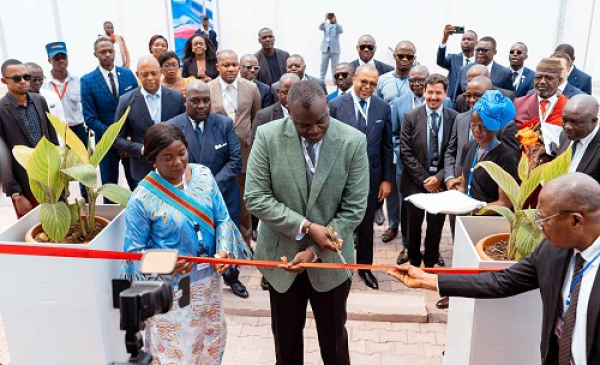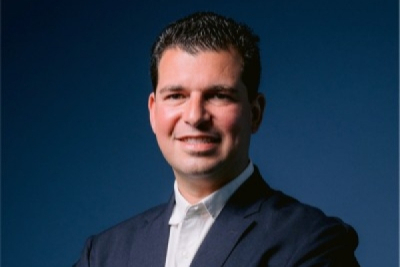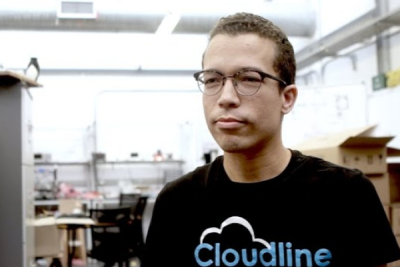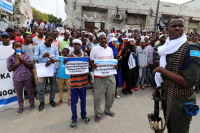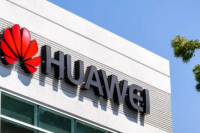As digital services become increasingly vital for economic activities, the availability of reliable data centres will support the growth of digital economies across Africa. This could foster a more interconnected and robust African digital ecosystem.
Africa’s leading carrier-neutral Tier III data center operator Raxio Group has officially inaugurated in Kinshasa its state-of-the-art data centre, Raxio DRC1, the group announced on August 22. This marks a significant milestone in the Democratic Republic of Congo’s digital transformation.
Hello DRC! Today marks the official inauguration of our Tier III certified data data centre in Kinshasa.
— Raxio Group (@raxio_group) August 22, 2024
Read the full market announcement:
👉🏼 https://t.co/hi7QLwJXh1#RaxioRDC #RaxioGroup pic.twitter.com/BqXGxkw781
This facility representing a $30 million investment has received Tier III accreditation from the Uptime Institute and becomes the country’s largest data center. Located in Limete area, the two-storey Raxio DRC1 spans 1,542 square meters and can accommodate up to 400 racks, delivering 1.5MW of IT power. The data centre is strategically positioned along key fibre routes, offering top-tier colocation and connectivity services, strongly emphasizing sustainability.
Raxio Group’s CEO, Robert Mullins, highlighted the importance of this facility in supporting the DR Congo’s burgeoning digital economy, stating :“With this facility, we are providing the critical infrastructure essential to supporting the digital economy and enhancing connectivity.”
The facility is part of Raxio’s broader strategy to build a pan-African digital backbone, with additional data centrers planned across the continent. The launch of Raxio DRC1 also lines up with the DRC government’s National Digital Plan (Plan National du Numérique), which aims to foster digital inclusion and economic growth through expansive digitalization.
The data centre is expected to play a key role in improving the country’s digital landscape by reducing latency for real-time applications and providing a reliable backbone for mobile and internet connectivity.
Raxio Group continues to expand its footprint with operational facilities in Uganda, Ethiopia, Mozambique, and now the DRC. The company is set to launch new centers in Côte d’Ivoire, Tanzania, and Angola, further solidifying its role in Africa’s digital transformation.
According to the "Africa Data Center Market Size - Industry Report on Share, Growth Trends & Forecasts Analysis Up to 2029" by Mordor Intelligence, the African data center market is projected to grow at a compound annual rate (CAGR) of 12.34% from 2024 to 2029. The increasing digitalization demand for cloud services and expanding data centres across the continent are key drivers of this growth.
Hikmatu Bilali
Algerian authorities plan to ultimately send 450 local startups to China, South Korea, and the United States. The goal is, among other things, to boost the local tech sector.
Public startup accelerator Algeria Venture announced on Thursday that it is sending two delegations of 30 high-potential local startups to China and South Korea.
The 15-day trips aim to expose Algerian startups to leading tech hubs, foster interactions with innovation leaders, and explore potential collaborations with global companies.
Explaining the purpose of these isits, Sidali Zerrouki, CEO of Algeria Venture, said, "These visits will provide startups with a global perspective and allow them to learn from the best international practices."
The initiative is part of Algeria Venture's Algerian Startup Exchange Program (ASEP), which supports the growth of local startups. ASEP aims to connect Algerian startups with global tech companies to benefit from their expertise, resources, and opportunities.
In 2023, Chinese startups attracted $27.4 billion in funding, according to the 2023 edition of the "State Of Venture" report by CB Insights, a strategic analysis company based on AI for business intelligence. Meanwhile, South Korean startups raised $9.8 billion in 2023, according to data from the Ministry of SMEs and Startups.
Adoni Conrad Quenum
He has already founded several tech companies, including a startup specializing in customer loyalty. His company uses technology to build stronger relationships between businesses and their customers.
Marwan Kenawy (photo) is an Egyptian serial entrepreneur and the co-founder and CEO of Dsquares, a leading provider of loyalty solutions in Europe, the Middle East, and Africa.
Founded in 2012, Dsquares specializes in loyalty and rewards programs, helping businesses strengthen their relationships with customers. The company offers a comprehensive range of tools that cover all aspects of business strategy, from merchant management to data analysis.
Dsquares provides a platform that integrates modern features, including points systems, electronic upgrade vouchers (e-vouchers), gamification, and robust analytics tools.
Operating in 10 countries across the Middle East and Africa, Dsquares collaborates with companies from various sectors, including banking, telecommunications, retail, travel, hospitality, automotive, and oil. To date, the startup has partnered with over 21,000 retail outlets and manages more than 75 customized programs.
In 2019, Kenawy co-founded Lucky App, an Egyptian startup aimed at revolutionizing shopping, payments, and savings in the Middle East and North Africa. The app has already attracted more than eight million users, offering credit products, discounts, and cashback rewards that can be used both online and in-store with thousands of local and international brands.
Kenawy holds a degree in business administration, which he earned in 2004 from the University of New Brunswick in Canada. He also obtained an international diploma in business administration and management in 2006 from Cambridge College in the United States.
After completing his studies, he joined Vodafone Egypt in 2006 as a senior channel marketing specialist. He subsequently held various positions, including team leader for the postpaid segment, head of business strategy and planning, and head of marketing for mobile internet and smartphones, before leaving the company in 2012.
Melchior Koba
Designed to make event organization easier for promoters, the online ticketing solution includes both management and marketing features.
South African startup Howler has developed a digital solution that allows event organizers to set up secure online ticketing for various events. Founded in 2014 in Johannesburg by Scott Witters, Shai Evian, Simon Powell-Jackson and Steven Cuzen, the company offers a comprehensive platform for event management.
Howler's solution includes an app available on iOS and Android, which has been downloaded over 10,000 times. The app enables on-site ticket verification through QR code scanning or participant searches using email, name or ID number. Most ticketing processes, however, take place on the web platform.
Event promoters create an account on Howler's web platform by providing personal information. They can then create custom events and sell tickets through the system. The solution caters to a wide range of events, including concerts, festivals, sporting events and exhibitions. It allows promoters to market their events, offer various payment options to customers and access management tools from their dashboard to adjust marketing strategies as needed. Its team also handles ticket delivery and other services.
Since its launch, Howler has issued more than 2.5 million tickets, processed over 10 million cashless transactions, and generated more than 1.5 billion rand ($83.2 million).
Adoni Conrad Quenum
In line with its mission to pioneer a sound financial ecosystem that benefits everyone, Zofi Cash helps employees manage emergencies and unexpected situations.
Zofi Cash is a fintech solution developed by a Ugandan startup that enables users, specifically company employees, to receive salary advances to address financial emergencies before payday. Founded in 2021 by Paul Kirungi and Gordon Turibamwe, the Kampala-based startup offers up to 50% of a user's salary as salary advance.
"The traditional 30-day pay cycle can leave people without funds during unexpected expenses and emergencies. Zofi Cash solves this problem by providing early access to wages, allowing employees to address immediate needs without waiting until the end of the month for payday," Zofi Cash explains.
Its digital solution includes a mobile app available on both iOS and Android, which has already been downloaded more than 50,000 times, according to Play Store statistics. Users must create an account with their personal information to access the fintech's services, and it is important to note that the user's employer must have a partnership with Zofi Cash.
In May 2023, it raised $1 million from Advancly, a business-to-business financing firm operating in six African countries, to support its growth.
Commenting on the funding round, Lotanna Julian, co-founder of Advancly, said, "Cash flow management is as important as earning money itself. The work that Zofi Cash is doing connects to our ultimate goal of building the rail tracks for a more robust financial ecosystem that delivers prosperity for all."
Adoni Conrad Quenum
Driven by his passion for engineering, he is developing autonomous airships to revolutionize global goods and services delivery. His startup has already received multiple awards and distinctions for its innovative approach.
Spencer Horne (photo) is a South African mechanical engineer and entrepreneur, best known as the founder and CEO of Cloudline, a startup focused on designing autonomous airships.
Horne established Cloudline in 2017 with the mission of connecting isolated communities to global supply chains. The company is developing a network of autonomous airships designed to deliver goods and services worldwide.
These innovative airships operate on batteries and solar energy, enabling zero-carbon flights. According to Cloudline, their airships can reduce carbon emissions by up to four tons per day compared to traditional helicopters. Each airship boasts a range of over 200 kilometers, an endurance of 12 hours, and a payload capacity of 100 kilograms.
Horne earned his bachelor's degree in mechanical engineering from Harvard University in 2014. During his studies, he completed an internship in 2011 with the wind energy development division of BioTherm Energy, a company specializing in renewable energy.
In 2012, he joined Mobius Motors, an automotive startup based in Kenya, as an engineering analyst. From 2014 to 2016, Horne worked as a business analyst for McKinsey & Company in South Africa.
In 2019, Horne was recognized as one of the 30 innovators on the Quartz Africa digital platform. That same year, Cloudline won the Safety Ideas Challenge organized by the insurer Santam, which honors companies offering innovative solutions in safety and insurance technology.
Melchior Koba
Educational technology company Schoolap, based in the Democratic Republic of Congo, has expanded into Kenya to grow its presence in Anglophone Africa. The move follows its success in Francophone markets, including the Democratic Republic of Congo and Côte d'Ivoire.
The platform, which offers digital curriculum management, interactive learning tools, and performance tracking, aims to address educational gaps and support Kenya's efforts to integrate technology into its education system.
As digital payments gain popularity in Africa, new laws introduced may hinder innovation in this sector.
Somali merchants launched protests on Monday, August 19, opposing a newly implemented 5% flat tax on electronic payments, especially those made via mobile phones. The levy, considered "inappropriate," adds to the existing financial burdens faced by the country's businesses.
"One of the main benefits of digital transactions is that they provide financial inclusion for people traditionally excluded from the formal banking sector. By taxing these transactions, the government effectively discourages the use of digital financial services, pushing people back toward cash transactions, which are less safe, less efficient, and less transparent," explained Abdillahi Hashi Abib, a member of the Somali Federal Parliament.
The tax, which went into effect on Sunday, August 18, is directly deducted from business accounts at the point of sale. The government intends to use the revenue to fund infrastructure and enhance security in the country, which has been battling an Islamist insurgency led by the Shebab militants for over fifteen years.
Defending the measure, Finance Minister Bihi Iman Egeh says it is a transparent tax established by a 1984 law, already approved by Parliament. He added that merchants' concerns stem from misunderstandings, without providing further details.
The implementation of this tax comes exactly one year after the introduction of a standardized QR code designed to facilitate contactless payments in Somalia and improve financial inclusion. The tax is expected to be passed on to consumers, with a limited effect on the overall profitability of businesses.
Samira Njoya
A law graduate, he embarked into entrepreneurship by creating a platform that enables graduates to easily land their first jobs.
South African lawyer-turned-entrepreneur Sbusiso Buna (photo) is co-founder and CEO of Jobox, a startup aimed at boosting graduate employability. The company helps students acquire the skills needed to enter and thrive in the job market.
Launched in 2019, Jobox links employers, students, and higher education institutions, offering companies tools to recruit suitable candidates.
"What we do is connect businesses, students, and universities. The core issue we aim to address is the difficulty young people face in finding work. Specifically, we're focused on graduates who finish university but then spend two years at home with a degree, unable to find employment,” Buna explains.
Jobox's talent discovery platform allows employers to post job offers and students to apply. Employers can schedule interviews and send offers to chosen candidates, who can accept or decline through the platform. Jobox also maintains a talent database to help companies find suitable profiles. For universities, it provides a portal for career events and student information.
Buna is currently the director of Brightest Young Minds, an organization that connects young leaders and facilitates skill development and solution creation across Africa.
In 2020, he co-founded and co-hosts the Unicorn Podcast, focusing on African startups. Before Jobox, he co-founded Doot Experiences in 2018, offering travelers unique experiences in Japan. He holds a law degree from the University of Pretoria. From 2018 to 2019, he worked at IQbusiness South Africa, advancing from associate consultant to senior associate. In 2022, he served as a business coach for Tshimologong Precinct, a technology innovation hub.
Melchior Koba
With the multiplication of digital transformation across Africa, cybersecurity has become a top priority for countries across the continent. To protect themselves and their institutions from potential threats, they are taking steps to strengthen their cyber defense.
Chinese tech company Huawei launched a cybersecurity training program for Zimbabwean government officials in Harare on Monday, aiming to strengthen their defenses against online threats.
The four-day course brings together 100 officials from various ministries. The curriculum covers global cybersecurity trends and data security governance.
"Huawei takes cybersecurity seriously, and we have made it a top priority in all of our operations and product development. Huawei invests heavily in research and development to ensure our technologies are secure and resilient against evolving cyber threats," said Yang Shengwan, managing director of Huawei Zimbabwe.
This initiative comes as digital transformation accelerates across Africa. Zimbabwe ranked 24th with a score of 47.7 out of 100 in the International Telecommunication Union's (ITU) Information and Communication Technology Development Index in 2024, up from 42.7 in 2023. In the ITU's Global Cybersecurity Index, Harare placed 17th in 2020 with a score of 36.49.
Adoni Conrad Quenum
More...
Last July, TerraPay raised $95 million to expand digital payments across the continent. The company continues its efforts by involving African stakeholders in its initiatives.
British payment solutions provider TerraPay has partnered with several mobile money operators, including Africa's Mpesa and Sama Money, to create the Wallet Interoperability Council, announces a press release dated August 20.
With that council, the British firm aims to interconnect mobile money operators to facilitate cross-border payments and fund transfers.
“This initiative addresses real market challenges and has the potential to reshape perceptions around wallet usage for cross border commerce; thus, enabling easy access for interoperability within the council's wallet participants globally,” said Sekou Kane Diallo, Deputy CEO and CIO of Sama Money.
The launch of this association comes at a time when mobile money solutions are rapidly expanding across the continent. According to the "State of the Industry Report on Mobile Money 2024" by the GSM Association (GSMA), the value of mobile money transactions in Sub-Saharan Africa reached a staggering $912 billion in 2023, a 22% increase from the previous year. The same report shows that Africa accounts for 835 million of the 1.75 billion registered mobile money accounts worldwide, representing 47.7% of the accounts.
Adoni Conrad Quenum
He is dedicated to improving people's lives through technology. As the head of an IT company, he develops high-impact technological solutions that have already earned him several national and international awards.
Holden Opolo Mbany (photo), a Gabonese tech entrepreneur, is the founder and CEO of YUbile Technologie, a company specializing in customized IT solutions. He launched the startup in 2013 under the name INNOV DEV, later rebranding it as YUbile Technologie in 2019.
YUbile Technologie focuses on developing information system solutions to help businesses increase their revenue. Mbany's vision is to energize the private sector and support Gabonese entrepreneurs in creating, developing, and owning the SMEs and large companies of tomorrow in Gabon and Africa.
In January 2022, YUbile Technologie launched Hosto, a digital health application that helps healthcare facilities better manage their operations and allows patients to easily communicate with healthcare professionals. Hosto is available in web, mobile, and desktop versions. Thanks to this innovation, YUbile was among the top 10 winners of the 2021 eStartup Challenge.
YUbile Technologie also offers Optimiz, a web application for budget management, and CommercialiZe, software for commercial activities. Additionally, it developed YETU, a platform that facilitates access to business documents and information, improving communication among employees.
Since 2016, Holden Opolo Mbany has served as Head of Information Systems and Telecommunications at the National Agency for Investment Promotion in Gabon. He holds an advanced degree in management, commerce, and marketing, obtained in 2012 from Concord Business College in Ghana.
After his studies, he worked from 2014 to 2016 as Product Development Manager at consumer goods’ wholesaler Cedicom Group. In July 2024, Holden Opolo Mbany received the Central Africa Founder of the Year award at the Global Startup Awards and is currently in the running for the African Founder of the Year award.
Melchior Koba
Starlink has introduced a monthly rental option for its hardware kits in Kenya, following the end of a previous limited-time offer. Users can rent the kit for KES 1,950 ($15.06) per month with a one-time activation fee of KES 2,700 ($20.85). This fee is separate from the monthly internet service costs.
Previously, the hardware kit cost KES 89,000 ($687.26), but the price has now dropped to KES 45,500 ($351.35) for outright purchase. The new rental plan aims to make Starlink’s services more accessible.
Coding academy CodeNgwana has partnered with the Matlhogonolo Community Outreach Centre to provide coding and computational thinking skills to 700 young learners in Soweto.
The initiative, launching in September, aligns with the Department of Basic Education’s (DBE) new curriculum, which includes coding and robotics for grades R-9.
CodeNgwana aims to make technology education accessible to all African children. The partnership will offer workshops at the Matlhogonolo Centre, focusing on both student programs and teacher training to ensure effective curriculum delivery.


